
When we talk about the early days of motherhood, we imagine soft lullabies, gentle embraces, and the beginnings of a bond that’s designed by nature to last a lifetime. But for some mothers and their newborns, this idyllic start is disrupted by the unexpected, unnecessary trauma of circumcision.
“Gaensbauer reported that trauma experienced by preverbal infants resulted in ‘symptomatology consistent with typical post-traumatic diagnostic criteria…The [adverse] developmental implications of early trauma, particularly if it is severe, appear to be significant.’ Neonates exposed to preverbal trauma (e.g., unanesthetized circumcision) may subsequently benefit from psychotherapeutic counseling.”
— Scientific Research Publishing
While the conversation around circumcision often focuses on cultural, religious, or perceived medical benefits, few address the emotional and psychological impact it can have on the mother-child relationship. Let’s dive into this rarely discussed but critical aspect of the circumcision debate.
The Sacred Bond: Why Early Connection Matters
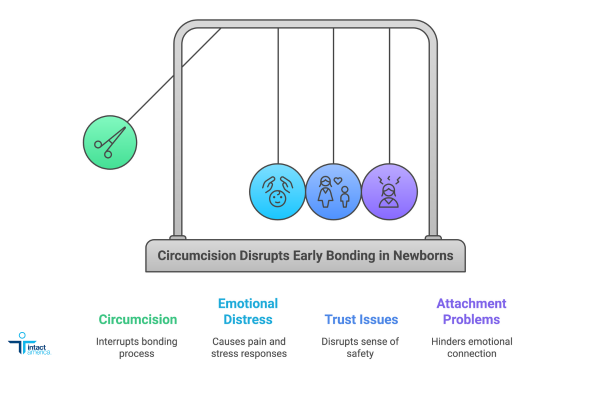
The first days after birth are a crucial time for bonding between mother and child. Skin-to-skin contact, breastfeeding, and gentle nurturing lay the foundation for emotional security, trust, and attachment. These interactions are essential for a newborn’s development and the mother’s psychological well-being.
When a newborn is circumcised, this delicate process is interrupted. The infant, just days old and completely dependent, experiences intense pain during the procedure. This pain triggers a cascade of physiological stress responses, which disrupt the baby’s sense of safety and interfere with the mother’s ability to comfort and connect with her child.
The Trauma of Circumcision
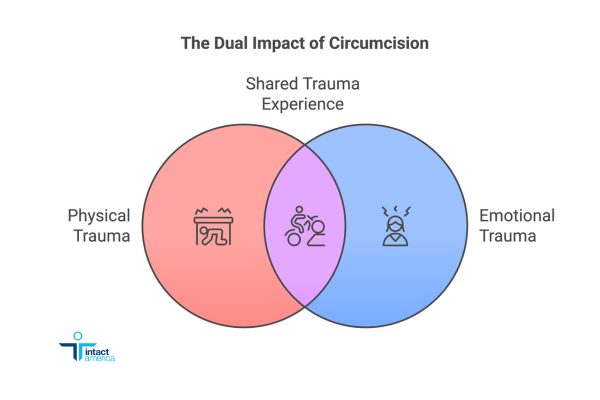 Circumcision is not a benign procedure. Studies show that newborns experience acute pain during circumcision, even with anesthesia, which is rarely administered in a way that completely blocks the discomfort. The trauma of the procedure floods the infant’s body with stress hormones like cortisol and adrenaline.
Circumcision is not a benign procedure. Studies show that newborns experience acute pain during circumcision, even with anesthesia, which is rarely administered in a way that completely blocks the discomfort. The trauma of the procedure floods the infant’s body with stress hormones like cortisol and adrenaline.
“Over a dozen studies confirm the extreme pain of circumcision. It has been described as ‘among the most painful [procedures] performed in neonatal medicine.’ In one study, researchers concluded that the pain was ‘severe and persistent.’ Increases in heart rate of 55 beats per minute have been recorded, about a 50 percent increase over the baseline. After circumcision, the level of blood cortisol increased by a factor of three to four times the level prior to circumcision. Investigators reported, ‘This level of pain would not be tolerated by older patients.”
— Circumcision Resource Center
But here’s the kicker: this a physical—and an emotional event. Infants are highly sensitive to touch, tone, and emotion. During and after circumcision, the baby’s cries of pain signal distress to the medical staff and, more importantly, to the mother. Many mothers report feeling helpless, anxious, or even traumatized themselves upon hearing their baby’s cries or seeing their child post-procedure.
You might also be interested in: 5 Compelling Arguments Against Circumcision
Interrupting the Bond
For bonding to occur, a baby must feel safe. After circumcision, the baby is often in pain, fussy, and difficult to soothe. This alters the natural rhythm of early interactions. Instead of being able to focus on bonding, mothers may spend hours or even days trying to calm a baby who is inconsolable due to the pain and shock of the procedure.
Furthermore, circumcision often leads to physical separation. Many hospitals perform the procedure in a separate room, away from the mother. This removes the baby from the mother’s comforting presence at a time when proximity is vital for attachment. For breastfeeding mothers, this separation can delay the establishment of a strong nursing routine, as pain and stress may make it harder for the baby to latch.
Long-Term Effects on Trust and Attachment
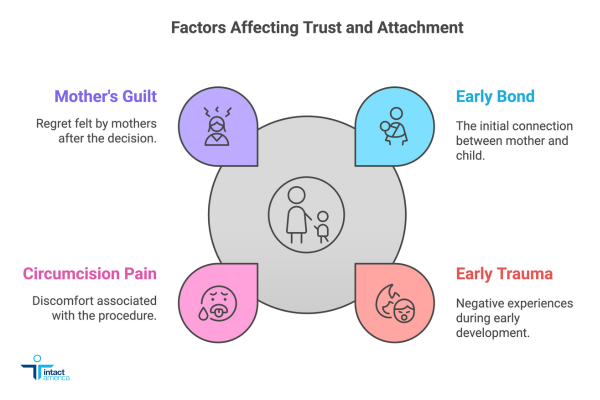
The early bond between mother and child sets the stage for lifelong attachment. Research in developmental psychology shows that early trauma can have long-lasting effects on a child’s sense of security and trust. The pain and stress associated with circumcision may condition the baby to associate the world—and even its caregiver—with danger rather than safety.
For mothers, the psychological toll can also be profound. Many women feel guilt or regret after consenting to circumcision, especially if they later learn that the procedure was unnecessary or that complications arose. This guilt can create emotional distance, undermining the bond that’s so critical in the first months of life.
The Role of the Medical System
It’s impossible to talk about circumcision without addressing the role of the medical system. In many cases, parents are not given full information about the risks and consequences of the procedure. The decision is often framed as routine or even beneficial, leaving mothers unaware of the potential impact on their baby’s well-being and their own emotional health.
Scary truth? Many doctors are openly and blatantly pushing pro-circumcision propaganda—check out this article debunking a doctor’s claims
Some mothers report feeling pressured by doctors or family members to consent to circumcision, even when their instincts tell them otherwise. This pressure can add to feelings of helplessness and resentment, further complicating the mother-child bond.
Why This Matters for Fathers, Too
Although the focus here is on mothers, fathers are not immune to the emotional fallout of circumcision. Many fathers who were circumcised themselves may feel conflicted about subjecting their child to the same procedure. This inner conflict can strain relationships between parents, especially if one parent feels strongly against the procedure but is overruled.
Moreover, fathers who witness the procedure or its aftermath often report feelings of guilt or distress. These emotions can ripple through the family dynamic, further complicating the bonding process for everyone involved.
Alternatives: A Better Way Forward
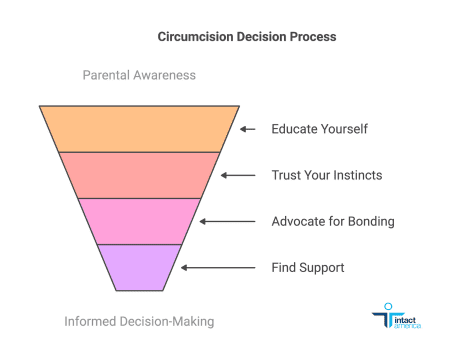
The good news? Circumcision is entirely avoidable. Here’s how parents can make decisions that prioritize bonding and emotional well-being:
- Educate Yourself: Learn about the risks and benefits of circumcision, as well as the cultural myths surrounding it. Many parents find that the supposed “benefits” of circumcision don’t hold up under scrutiny.
- Trust Your Instincts: If something about circumcision doesn’t sit right with you, listen to that feeling. Your baby’s health and happiness don’t depend on a procedure rooted in outdated traditions.
- Advocate for Immediate Bonding: Insist on skin-to-skin contact and avoid unnecessary separations in the hospital. The first hours and days after birth are precious—don’t let them be interrupted by a preventable procedure.
- Find Support: If you’re feeling pressure to circumcise, seek out support groups or resources that align with your values. Connecting with other parents who have faced similar decisions can be empowering.
A Personal Note to Mothers
To all the mothers out there struggling with this decision or grappling with regret, you’re not alone. The system is stacked against you, inundating you with half-truths and cultural pressure. But your instincts matter. Your bond with your baby is sacred, and no tradition or medical sales pitch should come between it.
If you’ve already chosen circumcision and feel regret, give yourself grace. We’re all navigating parenthood the best we can with the information we have. What matters most is the love and connection you build with your child moving forward.
If you found this article enlightening, enraging, or engaging, you might also be interested in Championing Change: Effective Ways to Support Intactivism
People Also Ask These Questions About How Circumcision Affects the Early Bonding Process Between Mother and Child
Q: How does circumcision impact the physical closeness between a mother and her newborn?
- A: Circumcision often leads to discomfort and crying in infants, which can interfere with the natural bonding moments, such as skin-to-skin contact, immediately after birth.
Q: Does the stress of circumcision affect the infant’s ability to nurse?
- A: The stress and pain from circumcision can make it harder for newborns to latch and breastfeed effectively, potentially disrupting breastfeeding and mother-child bonding.
Q: Can circumcision increase separation time between mother and baby in the hospital?
- A: Yes, circumcision procedures often result in additional time away from the mother for preparation, surgery, and recovery, which can limit early bonding opportunities.
Q: What emotional effects might circumcision have on the mother?
- A: Mothers may feel distressed or helpless when hearing their baby cry in pain during and after circumcision, potentially affecting their confidence and emotional state during the bonding period.
Q: What alternatives to circumcision support the natural bonding process?
- A: Educating families on proper hygiene and foreskin care can eliminate the perceived need for circumcision while preserving the opportunity for early bonding.





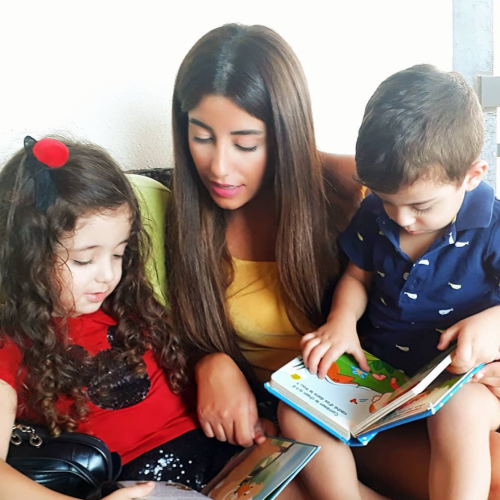
No Comments